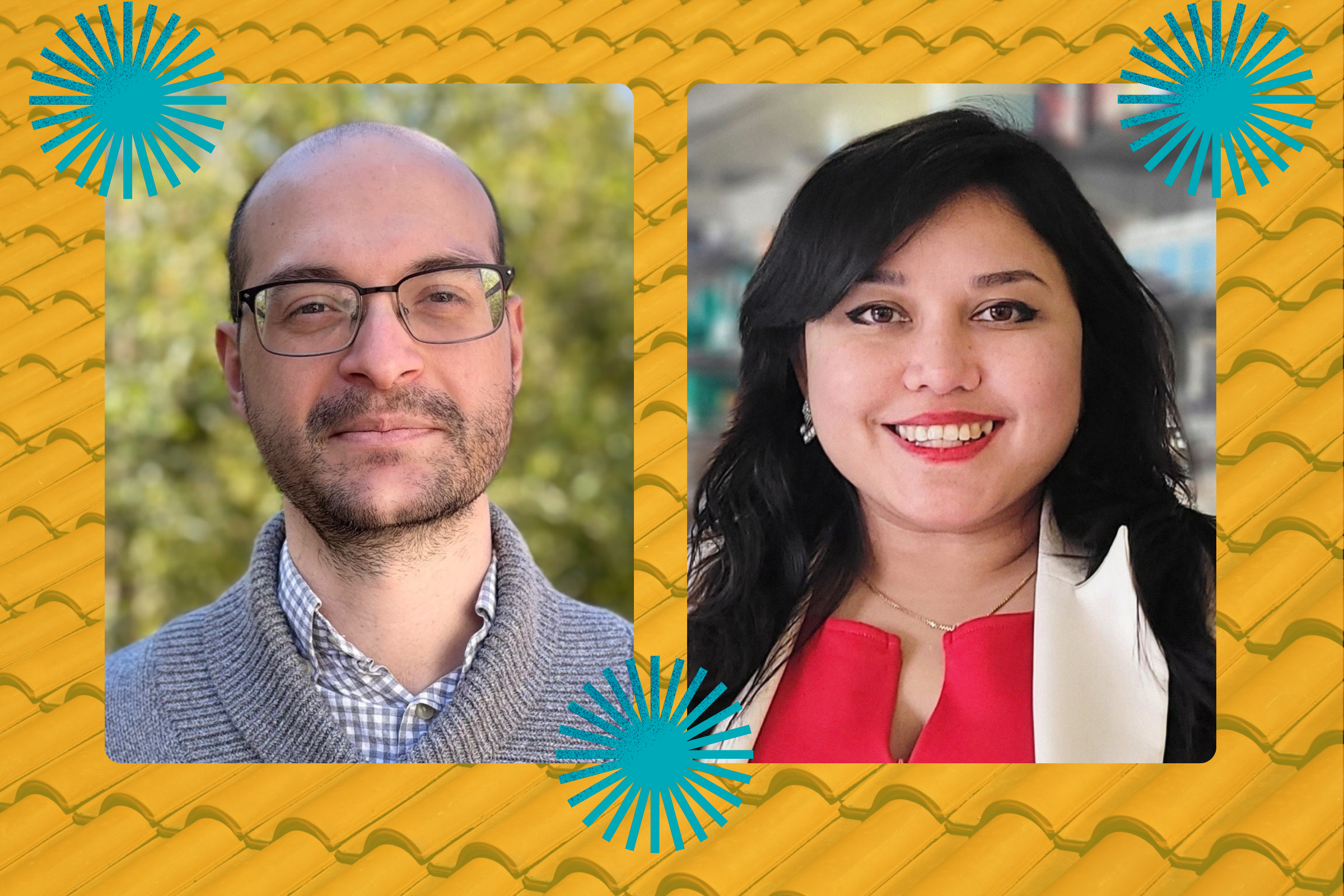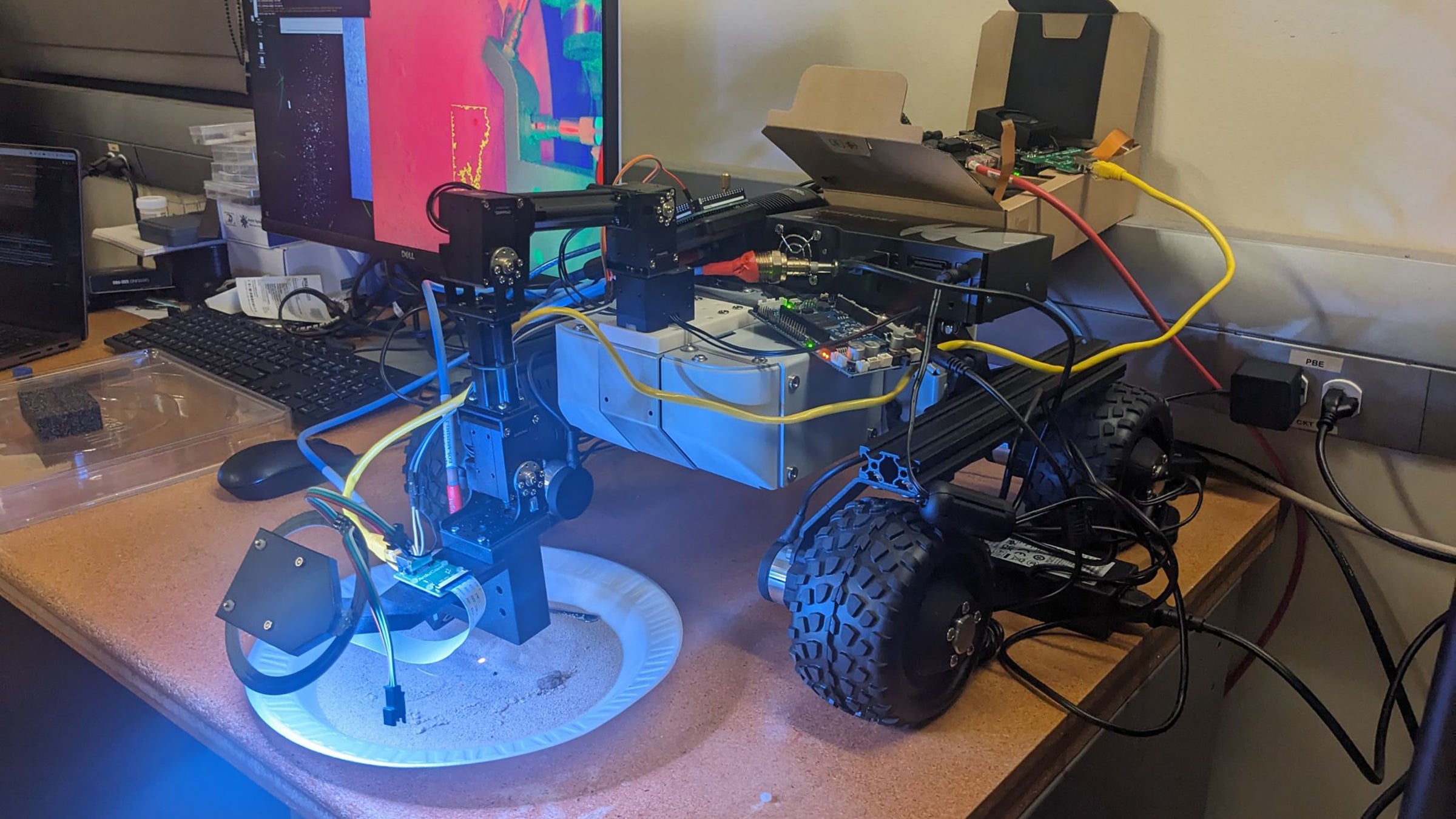The College Welcomed New Faculty in 2020
See the new faces at the College of Natural Sciences.
The College of Natural Sciences welcomed more than 20 leading researchers and captivating teachers as new tenured and tenure-track members of the faculty this academic year. Meet some of the newest scientists, mathematicians and technologists on our faculty.

Danielle Berg
Assistant Professor, Astronomy
Berg's research focuses on bridging our deepest understanding of galaxies, which comes from the local galaxies in our backyard, with the first seeds of galaxies in the very distant and early universe. She was a postdoc at The Ohio State University, where she primarily worked with Rick Pogge on the Chemical Abundances of Spirals (CHAOS) project to study the chemical abundance patterns across the faces of spiral galaxies. When she is not pondering profound astronomical questions, or soaking up the beauties of the night sky, she loves to travel, with a general goal to visit one new country a year and to keep exploring places that challenge her physically or emotionally. She received B.A. degrees in physics and mathematics from Gustavus Adolphus College and her Ph.D. in astrophysics from the University of Minnesota.

Simon Brandl
Assistant Professor, Marine Science
Brandl is a marine ecologist who seeks to understand how the diversity of species and their interactions shape biogeochemical fluxes in the world's oceans, and how this may change when environmental conditions are altered. His work integrates across fields of organismal, community and ecosystem ecology and is predominantly focused on small, bottom-dwelling fishes in coastal marine ecosystems such as tropical coral reefs. Simon received his Ph.D. in marine biology at James Cook University in Australia in 2016. After his doctorate, he was a MarineGEO postdoctoral fellow at the Smithsonian Environmental Research Center and an NSERC Banting postdoctoral fellow at Simon Fraser University in Canada.

Kristin Nielsen Bridges
Assistant Professor, Marine Science
Nielsen is an aquatic toxicologist with a research focus on the developmental toxicity of ubiquitous environmental contaminants to early life stage fish. She is particularly interested in establishing links between high level effects on fish fitness/physiology and contaminant-mediated molecular initiating events that occur during development. Her background includes professional risk assessment experience within the government and private sectors. She previously served as the Alaska State Toxicologist and Environmental Public Health Program Manager, working to communicate risk and perform public outreach/education in environmental justice communities. She completed her undergraduate work in biology at Texas A&M University and her Ph.D. and postdoctoral fellowship in aquatic toxicology at the University of North Texas.

John Chisholm
Assistant Professor, Astronomy
Chisholm was previously a Hubble Fellow at the University of California-Santa Cruz working with Prof. J. Xavier Prochaska. He was previously a postdoctoral scholar at the University of Geneva working with Prof. Daniel Schaerer. He obtained a Ph.D. in astronomy from the University of Wisconsin-Madison, working with Prof. Christy Tremonti. He attended Boston College, where He received a B.S. in physics with a minor in mathematics. In his free time, he travels as much as he can. He has visited 32 countries and has ordered dinner in 16 different languages. He enjoys hiking and snowboarding.

James Fleet
Professor, Nutritional Sciences
Fleet's research uses genetics and genomics to reveal the molecular and physiological functions of vitamin D in the intestine, including control of calcium absorption and the prevention of colon cancer. His research has been supported by multiple grants from the NIH, the USDA and the American Institute for Cancer Research. He was previously a Purdue University professor of nutrition science and has received a number of honors for his work including: the Mead Johnson Award from the American Society for Nutrition (2001), as a University Faculty Scholar(2004) and Distinguished Professor (2012) at Purdue, and being named a Fellow of the American Society for Bone and Mineral Research (2019). For over 10 years he has hosted a radio show called Acoustic Blend on WBAA in West Lafayette, IN, so he's looking forward to exploring the Austin music scene.

David Harwath
Assistant Professor, Computer Science
Harwath's research interests are in the areas of automatic speech recognition, spoken language understanding and multi-modal machine learning. His work aims to develop models of speech and language that are robust, flexible and capable of learning on the fly with minimal supervision and from multiple input modalities. Prior to joining UT, he worked as a research scientist at the MIT Computer Science and Artificial Intelligence Lab (CSAIL). He earned his Ph.D. from MIT, and received the 2018 George M. Sprowls Award for the best doctoral thesis in computer science. He also holds a master of science in computer science from MIT and a B.S. in electrical engineering from the University of Illinois at Urbana-Champaign.

Nhat Ho
Assistant Professor, Statistics and Data Sciences
Ho's research focuses on four principles of statistics, machine learning, and data science: heterogeneity (Bayesian nonparametrics, mixture and hierarchical models), interpretability (model misspecification, deep generative models, convolutional neural networks), stability (robust statistics, (non)-convex optimization in statistical settings) and scalability (computational optimal transport, sampling and variational inference, distributed computing). Previously, Ho was a postdoctoral fellow in the Electrical Engineering and Computer Science Department at the University of California, Berkeley, under Professor Michael I. Jordan, and Professor Martin J. Wainwright. He earned his Ph.D. in Statistics from the University of Michigan in 2017.

Andrés Jara-Oseguera
Assistant Professor, Molecular Biosciences
Jara-Oseguera obtained his B.S. degree in basic biomedical research from the National Autonomous University of Mexico (UNAM) and his doctorate in biomedical sciences from UNAM, working in the laboratory of Léon D. Islas in the Department of Physiology at the School of Medicine. He obtained postdoctoral training in the lab of Kenton J. Swartz at the National Institute of Neurological Disorders and Stroke (NINDS/NIH) before joining the Department of Molecular Biosciences in the College of Natural Sciences at the University of Texas at Austin as an assistant professor. Andrés was awarded the 2009 Student Paul F. Cranefield Award from the Society of General Physiologists, the UNAM 2012 Alfonso Caso Medal for the best graduate thesis work in the Biomedical Sciences, a NINDS Competitive Intramural Fellowship Award, and a NINDS K99 Pathway to Independence Award.

Andreas Karch
Professor, Physics
Karch's research tries to unravel some of the most fundamental mysteries of our universe. How can we combine the two building blocks of modern physics, quantum mechanics and Einstein's relativity, into one consistent framework? What happens to quantum information when it falls into a black hole, does information get destroyed forever? What macroscopic material properties can arise from simple microscopic laws? To address these questions, Karch uses tools from string theory and quantum field theory. Karch did his undergraduate studies at the University of Würzburg and received an M.A. in physics from UT Austin and his Ph.D. from Humboldt University in Berlin. He held postdoctoral positions at MIT and Harvard before joining the faculty at the University of Washington in Seattle.

Joseph Kileel
Assistant Professor, Mathematics
Kileel's research interests lie in applied mathematics, mathematical data science and computational algebra. His specific areas of interest include: inverse problems in computer vision and imaging science, especially cryo-electron microscopy and X-ray free electron lasers; fast methods for numerical tensor decompositions and their applications; and mathematical theory for non-convex optimization. Kileel is a core faculty member of the Oden Institute and a member of its graduate studies committee. From 2017-2020, he was a postdoctoral fellow at the Program in Applied and Computational Mathematics at Princeton University. In 2017, he earned his Ph.D. in mathematics from the University of California, Berkeley.

Kenneth McMillan
Professor, Department of Computer Science
Joining in January, McMillan's primary research interest is in making automated formal verification tools that are usable and productive in the development of real systems, and especially in the interaction of humans and machines in formal reasoning. He is also interested in the application of concepts from automated verification to explainable AI. His past contributions to formal methods include the introduction of Symbolic Model Checking and Craig Interpolation methods, techniques that expand the scalability and range of automated verification. He worked for many years in industrial research, at AT&T Bell Labs, Cadence Research Labs, Microsoft Research, and Amazon Web Services, joining the CS faculty at UT in 2021. He serves on the steering committee of the Computer-Aided Verification conference.

Pablo Laguna
Professor, Physics
Laguna is a computational astrophysicist, investigating phenomena involving systems with black holes and neutron stars. These systems provide the ultimate expression of Einstein's theory of General Relativity. Laguna's computational studies are contributing to a new astronomy based on gravitational wave observations. Laguna received his bachelor's degree in physics from the Universidad Autonoma Metropolitan at Iztapalapa in Mexico City, and his doctoral degree in physics from the University of Texas at Austin. He was a postdoctoral fellow at the Center for Relativity in the University of Texas at Austin and at Los Alamos National Laboratory. He previously was on the faculty as a visiting assistant professor at Drexel University and as a professor at both Penn State and Georgia Institute of Technology, where he served as the first director of the Center for Relativistic Astrophysics and as chair of the School of Physics. Laguna was named fellow of the American Physical Society, elected to the Mexican Academy of Science and selected for the Edward A. Bouchet award from the American Physical Society "for contributions to numerical relativity; in particular, on the simulation of colliding black holes."

Amy Lee
Professor, Neuroscience
Lee is broadly interested in the structure and function relationships of voltage-gated Ca2+ channels and the roles that these channels play in orchestrating the development and mature function of the nervous system. She received her Ph.D. in Neuroscience at the University of Virginia under the mentorship of Kevin Lynch and went on to postdoctoral work with William Catterall at the University of Washington. She began her independent research career in the Department of Pharmacology at Emory University. In 2009, she moved to the Department of Molecular Physiology and Biophysics at the University of Iowa, where she rose through the ranks to full professor in 2015. She also served as Assistant Dean for Research in the Carver College of Medicine.

Vagheesh Narasimhan
Assistant Professor, Integrative Biology
Narasimhan's research lies at the intersection of computer science, statistics and genomics. The research in his laboratory is focused on two primary directions. The first is on building computational and statistical methods for large datasets, in particular for biobank scale medical imaging, genetic and health record data. The second half of the lab is focused on generating and analyzing time series genomic data through the use of ancient DNA technology which allows for the sequencing of genetic information from skeletons many thousands of years old. Narasimhan conducted postdoctoral training at the Department of Genetics, Harvard Medical School, and received his Ph.D. in mathematical genomics and medicine from the University of Cambridge.

Jessica O'Connell
Assistant Professor, Department of Marine Science
O'Connell is a wetland plant ecologist, data scientist and remote sensing specialist. Her research evaluates spatiotemporal processes in coastal landscapes related to forecasting ecosystem resiliency to stressors, such as climate change and sea level rise. She often creates scalable open-science tools that map changes in ecosystem functions at the landscape-scale. She received her B.A from Sonoma State University, her M.S. from Louisiana State University, and her Ph.D from Oklahoma State University. She completed her postdoctoral work at the University of California at Berkeley and at the University of Georgia, in affiliation with the Georgia Coastal Ecosystems Long-Term Ecological Research Project.

Nicole Perry
Assistant Professor, Human Development and Family Sciences
Perry's research focuses on the development of self-regulatory processes, particularly the regulation of emotion, during infancy and early childhood. She uses biopsychosocial models to investigate how development across levels of functioning (i.e., biological, behavioral, environmental) build upon and integrate with one another to contribute to the early emergence of children's emotional and behavioral regulation and, subsequently, mental health and adjustment. In addition, her work aims to better understand how early caregiver relationships shape and are shaped by young children's neurobiology, stress reactivity, social skills and regulatory capabilities. Perry earned her B.S. in psychology from Arizona State University, and her M.S. and Ph.D. in human development and family studies from the University of North Carolina at Greensboro.

Susanne Ressl
Assistant Professor, Neuroscience
Ressl's research aims to bring mechanistic insights into how synaptic organizing interact with membrane proteins at the synapse, shaping the fundamental biology of neurons. Before joining UT, she was an assistant professor at Indiana University, Bloomington. She received a B.S. in biology and an M.S. in biophysics, zoology and immunology at the Gutenberg University, Mainz, Germany. She earned her Ph.D. in biochemistry from the Goethe University and the MPI of Biophysics in Frankfurt, Germany. Ressl trained as a postdoc at Stanford University, where she started her research program in structural neuroscience discovering new synaptic protein complexes that influence memory formation.

Deirdre Shoemaker
Professor, Physics
Shoemaker is a physics professor and the director of the Center for Gravitational Physics at the University of Texas at Austin. Her research interests center on black holes and gravitational waves, understanding these and other aspects of strong gravity and how it reveals itself in the universe. To that end, Shoemaker works with gravitational wave detector teams to use the observations to understand gravitational physics. She is a member of LIGO Scientific Collaboration, the Cosmic Explorer Consortium, and the LISA Consortium where she co-chairs the Waveform Working Group. She has won the NSF CAREER award and is a fellow of the American Physical Society. She received her B.S. in physics, astronomy and astrophysics from Pennsylvania State University and her Ph.D. in physics from UT Austin. She was a postdoctoral fellow at Penn State and Cornell University before joining the faculty at Penn State and later moving to the School of Physics at Georgia Tech.

Xue-Xin Wei
Assistant Professor, Department of Neuroscience
Wei studies how the brain exploits the statistical regularities of the environment to support adaptive and intelligent behavior. He works at the intersection of computational/theoretical neuroscience, statistics and AI/deep learning. His research formulates computational models of the brain's functions and tests the predictions thereof rigorously against data by collaborating closely with experimentalists. Wei received his B.S. in mathematics and applied mathematics from Peking University and his Ph. D in psychology from the University of Pennsylvania, where he received the Louis B. Flexner Outstanding Thesis award. Before joining UT, he was a postdoctoral research scientist in the Center for Theoretical Neuroscience and Department of Statistics at Columbia University.

Sinead Williamson
Assistant Professor, Statistics and Data Sciences
Williamson's research focus is the development of nonparametric Bayesian methods for machine learning applications. In particular, she is interested in constructing distributions over correlated measures and complex structures, in order to model structured data sets or data with spatio-temporal dependence. Examples include models for documents whose topical composition varies through time, and models for temporally evolving social networks. A key research goal is the development of efficient inference algorithms for such models, and she is currently investigating methods that allow us to apply Bayesian nonparametric techniques to large datasets. She received her master of engineering from the University of Oxford, M.Sc. from University College London and Ph.D. from the University of Cambridge. Before joining the faculty in the College of Natural Sciences, she was a postdoc at Carnegie Mellon University, a faculty member in the McCombs School of Business and a senior research scientist with Amazon and lead machine learning scientist with CognitiveScale.
Additional new faculty members in Natural Sciences are:
- Michael Aubrey, assistant professor, Department of Chemistry
- Allesia Lodia, assistant professor, Department of Nutritional Sciences



